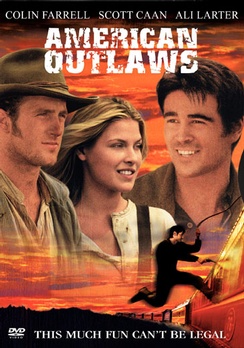
AMERICAN OUTLAWS
US, 2001, 94 minutes, Colour.
Colin Farrell, Scott Caan, Ali Larter, Gabriel Macht, Gregory Smith, Harris Yulan, Kathy Bates, Timothy Dalton, Will Mc Cormack, Ronnie Cox, Terry O’ Quinn.
Directed by Les Mayfield.
American Outlaws is another version of the Jesse James and the Jesse James gang story. Already in the 30s, Tyrone Power had appeared as Jesse James and in 1941 Henry Fonda appeared in The Return of Frank James. Other actors who have essayed the role include the Keaches in The Long Rider, Stacey and James Keach playing Jesse and Frank James. Robert Wagner was in The True Story of Jesse James. Brad Pitt was Jesse James in the much more serious The Assassination of Jesse James by the Coward Robert Ford.
This is a much more straightforward story. Irish Colin Farrell, at the beginning of his international career, plays Jesse James much as the image of Colin Farrell. Gabriel Macht (later The Spirit) is Frank James. Scott Caan is Cole Younger, the man envious of Jesse James and wanting to lead the gang. Ali Larter is Zee, Jesse James’ wife, and Kathy Bates is his mother. Timothy Dalton appears as a rather quizzical Alan Pinkerton and Harris Yulan is Thaddeus Raines, the president of the Rocknorthern Railroad.
There are action sequences at the end of the civil war with the James brothers fighting for the South. They then return home, their farm is threatened by the president of the railroad and his executives as well as by Alan Pinkerton who was the founder of the Secret Service. In reply, especially after Mrs James is killed in a fire, the James gang starts to rob banks. The film shows the robberies, the rivalries in the group, Jesse wanting to pull out and to marry, his arrest by Pinkerton, his escape. The film celebrates the legend of Jesse James – although there are scenes where his wife is reading one of the popular magazine stories about him which created an untrue and exaggerated image. For the more serious look at the James brothers, The Assassination of Jesse James is a much more fruitful and rewarding experience.
1.The popularity of Jesse James and the James gang? The film tradition from the 1930s? This film as part of the tradition?
2.The battle scenes of the civil war? Missouri and the American Midwest? The farming lands? The railroad, the trains, the holdups? Chicago and the city atmosphere? The period, production design, décor, costumes? The musical score?
3.The title, the focus on the James gang and their reputation as outlaws? The reasons given for their being outlaws, the oppression by the railroad companies, the government? Ousted from their land? The murderous behaviour of the companies? Credible reasons for their becoming outlaws?
4.The civil war, the battles, the consequences, the return home, the dreams of the farm? The happy reunion of the James family, Ma James? Jesse meeting Zee, in love?
5.The offers from Thaddeus Raines, Roland H. Parker and his representing Raines? The offer of the money? Pinkerton’s presence? The rejection by the Jameses? The further confrontations? The burning of the homes? Raines as a character, his ruthlessness, despising the farmers? Parker as his aide? Pinkerton and his criticisms of Raines’ methods?
6.Jesse, in himself, leadership qualities? Cole Younger, his leadership qualities? Friendship with Jesse? Second-in-charge? Criticising, wanting to be in charge – and his failure of judgment in robbing the bank which was a set-up for catching the outlaws? The bank manager asking where Jesse James was in the subsequent holdups? His reconciliation with Jesse?
7.The other members of the gang, Frank James as the older brother, his skill in shooting, supporting Jesse? The Younger brothers, Jim Younger, his being considered too young for the group, his acceptance, skill with a gun? The pathos of his death and funeral? Bob Younger and his wanting to have a reputation, his acting as if he was mad, wanting his reward to go higher, his performance during the robberies?
8.Zee, growing up, love for Jesse, his proposal, the marriage? Her participation in the raid to free him from the train? Her father, sympathetic doctor, healing Jesse’s wounds?
9.The robberies, the staging, their wanting to be gentlemen about the robbery? Treatment of people? The old man outside the bank, their persuading him to wait? Their reputation, rewards? Jesse being wounded, recovering?
10.Pinkerton, his being the measuring rod for the morality of both sides? His role as founder of the Secret Service? His detective agency? His letting Jesse go at the end, advising him to go to Tennessee?
11.The popular western ingredients – and a 21st century treatment of the story?